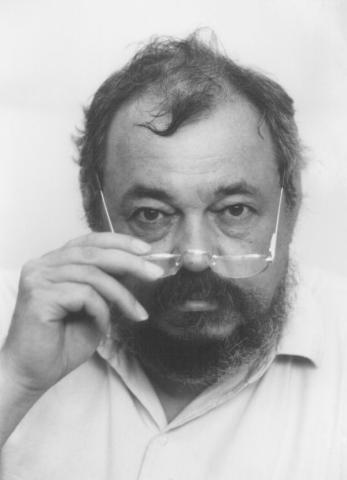Lázár Ervin: Biography
Ervin Lázár (Budapest, 5 May 1936 – Budapest, 22 December 2006)
Kossuth and Attila József Prize-winning writer. Founding member of the Digital Literature Academy from 1998 until his death.
*
Born on 5 May 1936 in Budapest. His father István Lázár was a manorial administrator, and his mother was Etelka Pentz. He spent his childhood in Alsó-Rácegrespuszta, Tolna County, where the Lázár family lived until 1951. He attended school in the nearby villages. He began his higher education in the Faculty of Humanities at Eötvös Loránd University, majoring in journalism. Later he moved to Pécs, where he worked as a journalist and also pursued Hungarian studies at university. He graduated with a teacher’s degree in 1961.
From 1959 to 1963 he worked for a local newspaper in Pécs. In 1964–1965 he worked for the Dunántúli Napló and the Jelenkor literary journal. In 1965 he moved to Budapest, where he worked as a copy editor for Élet és Irodalom until 1971. After that, he worked as a freelance writer until 1989.
From 1959 to 1994 he was a member of the National Association of Hungarian Journalists, where he also took part in the work of the Ethics Committee between 1991 and 1994. He joined the Hungarian Writers’ Association in 1969 and was a member of the board for many years. He was a member of the Hungarian Academy of Arts from 1994.
For him, childhood was a defining experience: he confessed to drawing most of his inspiration from his childhood years. His style is cinematic, his dialogue is balladically concise. His language is unique and playful, enriched by his own humour and irony which add layers of meaning. The problem of moral values has always been at the heart of his writing. His first short story was published in Jelenkor in 1958.
In 1964, his fairy tale novel The Little Boy and the Lions (A kisfiú és az oroszlánok) was published by Móra Publishers, with illustrations by László Réber, who later became a lifelong co-creator. In 1966, his first collection of short stories was published under the title Truncated Thursday (Csonkacsütörtök), followed shortly by his second, A Shovelful of Coal for Nellie (Egy lapát szén Nellikének, 1969), and then by his third, Buddha is Sad (Buddha szomorú, 1973), which already had absurdist overtones.
His most important genre remained the short story and the fairy tale. His grotesque novel The White Tiger (A fehér tigris, 1971) remains his only longer prose work.
His fairy tales were told in a new and distinctive voice, which endeared him to his readers. The Seven-Headed Fairy (A Hétfejű Tündér, 1973) was published many times and was adapted for the stage, which ensured that the author could continue to work as a freelance writer. In 1982, he was given the international Andersen Award for his fairy tale novel Berzian and Didekhi (Berzsián és Dideki). The Square Round Forest(A Négyszögletű Kerek Erdő, 1985) won the Book of the Year Award – followed by The Adventures of Berci Bean (Bab Berci kalandjai, 1989) and Star Manor (Csillagmajor, 1996).
His stories have been awarded the Children’s Book of the Year prize three times in 1989 (The Adventures of Berci Bean), in 1990 (Horses, Dogs, Birds [Lovak, kutyák, madarak]), and in 1993 (The Elf Factory [A manógyár]).
His short stories have been collected in several editions, the most comprehensive selection being My Seven Lovers (Hét szeretőm, 1994). He published a cycle of new short stories, Star Manor, in 1996, evoking the atmosphere of the homeland and the wilderness. Little Angel (Kisangyal), a collection of his older and unpublished short stories, was released in 1997.
He was married to writer Zsuzsa Vathy.
He died on 22 December 2006 in Budapest.
The biography was written by Zsuzsa Gulyás, translated by Benedek Totth and Austin Wagner.

